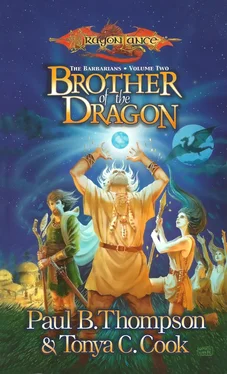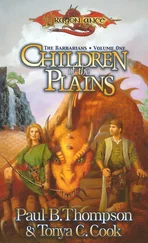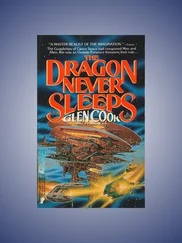Paul Cook - Brother of the Dragon
Здесь есть возможность читать онлайн «Paul Cook - Brother of the Dragon» весь текст электронной книги совершенно бесплатно (целиком полную версию без сокращений). В некоторых случаях можно слушать аудио, скачать через торрент в формате fb2 и присутствует краткое содержание. Жанр: Фэнтези, на английском языке. Описание произведения, (предисловие) а так же отзывы посетителей доступны на портале библиотеки ЛибКат.
- Название:Brother of the Dragon
- Автор:
- Жанр:
- Год:неизвестен
- ISBN:нет данных
- Рейтинг книги:3 / 5. Голосов: 1
-
Избранное:Добавить в избранное
- Отзывы:
-
Ваша оценка:
- 60
- 1
- 2
- 3
- 4
- 5
Brother of the Dragon: краткое содержание, описание и аннотация
Предлагаем к чтению аннотацию, описание, краткое содержание или предисловие (зависит от того, что написал сам автор книги «Brother of the Dragon»). Если вы не нашли необходимую информацию о книге — напишите в комментариях, мы постараемся отыскать её.
Brother of the Dragon — читать онлайн бесплатно полную книгу (весь текст) целиком
Ниже представлен текст книги, разбитый по страницам. Система сохранения места последней прочитанной страницы, позволяет с удобством читать онлайн бесплатно книгу «Brother of the Dragon», без необходимости каждый раз заново искать на чём Вы остановились. Поставьте закладку, и сможете в любой момент перейти на страницу, на которой закончили чтение.
Интервал:
Закладка:
A strange sensation spread over his hands. Though hot with sweat and sticky with blood, his extremities suddenly felt cold as ice. At the same time, Tiphan felt a glow on his closed eyelids. He cracked his eyes open and saw the shard in his hands exuding the same blue-white light he’d seen in the spirit lightning.
What was happening? Had his plea been heard?
Holding the stone in one hand, Tiphan scooped the other bags into his arms. Just in time, as the cold light grew larger and larger, finally engulfing him. His terror evaporated in triumphant joy. The charging elves faded into the now dazzling blaze. Tiphan exulted. Success! The power was in his hands at last! He’d done it!
As the open plain faded before his vision, Tiphan heard the sound of laughter.
The days following Duranix’s departure were mild and sunny. The ice in the fields melted, and the planters waited anxiously to see whether the orchard would survive. Layers of hay and smudge fires helped, but the final proof would be evident soon. Either green shoots would rise from the soggy fields, bringing with them the hope of a new crop, or they would not. Dead seedlings, like dead bodies, remained buried in the unforgiving ground.
Amero busied himself laboring on the wall. News that the Silvanesti were on the move again put new urgency into the work. He kept Duranix’s vague fears of a western threat to himself. He saw no reason to frighten his people with a menace too shadowy to name.
The best stone for the wall was quarried from the cliff face between the village and the mouth of Cedarsplit Gap. It was dense gray-white granite, speckled with black. The method of building, which had evolved over many seasons’ work, was simple but effective. The blocks were dragged on huge travois from the quarry to the base of the wall. Long ramps of packed earth rose along the inside and outside of the wall. Timber supports kept the ramps stable while building proceeded. The ramps were paved with smooth cobblestones taken from the abundant supply washed into the lake by the waterfall.
Looking back now over the length of finished wall, Amero marveled at how many of the heavy stones had been moved over the years. It was punishing work. Many times Amero passed his nights at Lyopi’s house, where she patiently wrapped his battered hands with strips of soft doeskin soaked in mint and other soothing herbs. There he slept like a dead man, yet awoke every morning eager to continue the arduous task. There was something very satisfying about raising the great wall around Yala-tene.
After eight days of community labor, the northern gap was finally closed. The new stretch of wall was as yet only head-high, but a continuous ring of stone enclosed the village at last. To commemorate the accomplishment, a celebration was declared for the next evening.
On the morning of the feast, firepits were dug and cords of hardwood laid for a hot, ashy fire. The air filled with sweet smoke as oxen began to roast. Food stores in the long tunnels hollowed out of the mountain were relieved of dried fruit and vegetables, stored there since the autumn harvest. That evening, when all was ready, the builders saluted their success. Though wine flowed freely, it was not a riotous gathering. Most of the people were too tired to celebrate too strenuously.
Songs were sung and tales told. The stories were of the old life on the plains, of endless wandering and life at the mercy of nature, great hunts, pursuits by fierce animals, deadly storms, floods, and marvels encountered on the open savanna. As the words were spoken, Amero watched the faces of his people. The young listened to the old tales closely, enthralled by the everyday hardiness of their ancestors. The elder villagers, many of whom had lived the nomadic life, reacted to the tales in different ways. A few smiled, but many sat with eyes downcast or with a far-off look that spoke of memories at work. Several wiped away tears.
As he listened, Amero’s own memories stirred. His thoughts were not of the wandering life, but of Duranix and Yala-tene. He’d lived more than half his life in this valley with these people. What a long way we’ve come, he thought.
Talk died as the work of many days caught up with the villagers. Snores became plentiful. Some of the crowd tottered away to sleep in their own beds. Others just put their heads in any convenient lap and dozed.
Amero, fuzzy with wine and fatigue, watched the flames in the firepit burn down to a glowing pool of embers. Lyopi was curled up beside him. Looking down at her fondly, one hand idly smoothing her chestnut hair, he gradually noticed something strange was happening. The flames in the firepit were slowly dying, yet light bathed the banquet scene — a bluish-white shine like Soli’s glow, but more intense and pervasive. The strange light, Amero realized, was coming from inside the town.
He stood gently so as not to wake Lyopi. Others in the crowd were still awake, and they had noticed the strange light, too.
“Arkuden,” said Udi, the beekeeper’s son, “what can it be?”
“I don’t know,” he replied truthfully.
“It’s coming from the Offertory,” Hulami said.
Indeed it was. Amero set off for the enclosure, followed by a dozen townsfolk. From four houses away, he could see the source of the light was indeed the Offertory. The eerie glow filled the street, washing the color from everything it touched.
When they reached the entrance to the Offertory, they found the Sensarku assembled in the courtyard, kneeling before the high cairn. Atop the stone platform stood an elongated, pear-shaped ball of light, so dazzling it hurt the eyes.
“What is this?” Amero blurted. The reverent acolytes nearest the entrance held fingers to their lips and shushed Amero. Irritated, he strode into the courtyard. The acolytes tried to stop him, but he kicked them off roughly and called, “Konza! Konza, what is going on?”
The old man, crouching by the altar, stood up. “Quietly, please, Arkuden!” he said, voice taut with emotion. “Do not insult the Omen!”
Konza sidled through the ranks of his followers and took Amero aside. “It appeared after sunset,” he whispered. “The boys were washing the cairn when this… spirit-omen arrived.” He looked up at the bright mass with wonder on his face. “It must be a sign from the dragon!”
Amero was doubtful. Duranix had many abilities, but Amero had never known the dragon to do anything like this.
He went to the footholds cut into the front of the cairn. More Sensarku protested, but Konza quieted them with a look. More curious than afraid, he climbed toward the orb. Up close, it gave off no heat and made no sound, but the light was truly blinding, and Amero had to shield his eyes. It seemed to be spinning rapidly, like a child’s top.
Listening intently, Amero became aware of a faint, massed whispering, as though scores of voices were murmuring at once. The voices seemed to echo, as though coming from a hollow place, like the deep interior of a cave. Amero strained to make sense of the words, but could not.
Questions burned in him as brightly as the strange light. He wanted very much to touch the brilliant object, to know what it was made of. He drew his bronze Silvanesti dagger. It was a span long, with an oilwood handle. He extended the point at the orb. The whispery, distant voices increased in volume as his blade approached. They grew so loud that Amero winced in pain, but he still couldn’t understand them or pick out a single voice from all the chaos. It seemed clear the voices didn’t like the dagger.
“Do you hear that?” he shouted over the din.
Konza was just a few steps away. He said, “Hear what, Arkuden?”
Setting his jaw, Amero shoved the dagger forward. Voices and light merged into a clap of thunder. All Amero had time to do was fling an arm over his eyes before his feet left the platform. He landed hard on his back, the impact driving the wind from his body.
Читать дальшеИнтервал:
Закладка:
Похожие книги на «Brother of the Dragon»
Представляем Вашему вниманию похожие книги на «Brother of the Dragon» списком для выбора. Мы отобрали схожую по названию и смыслу литературу в надежде предоставить читателям больше вариантов отыскать новые, интересные, ещё непрочитанные произведения.
Обсуждение, отзывы о книге «Brother of the Dragon» и просто собственные мнения читателей. Оставьте ваши комментарии, напишите, что Вы думаете о произведении, его смысле или главных героях. Укажите что конкретно понравилось, а что нет, и почему Вы так считаете.












